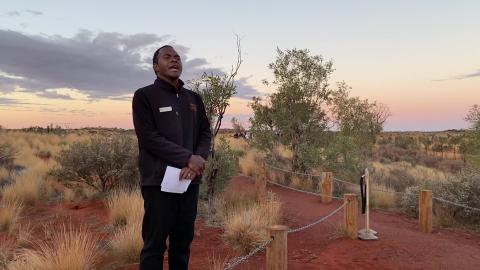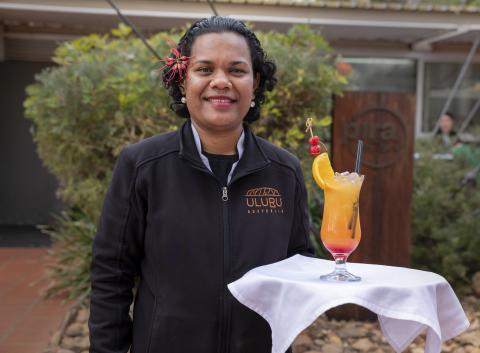Australia's Red Centre is a vastly different environment to the blue waters of the Pacific, but one group of Fijians has embraced the change – moving to the outback to learn new skills and earn an income working at one of Australia’s most iconic locations.
The 163 Fijians have taken up roles with Voyages Indigenous Tourism Australia’s Ayers Rock Resort (Voyages) in the Northern Territory. The company’s core purpose is to change the lives of Indigenous Australians through cultural tourism. One way it does this is by supporting young Indigenous Australians through its National Indigenous Training Academy (NITA) where many graduates then take on employment at Voyages or in other parts of Australia. Voyages also employs Aboriginal and Torres Strait Islanders from all over Australia, including the local communities surrounding the resort.
Before COVID, Voyages filled its workforce gaps with backpackers and international workers, but with the pandemic border closures it could not access its usual overseas workforce. In 2021 it looked to the Pacific Australia Labour Mobility (PALM) scheme as a solution.
"It has been an amazing scheme to be involved in and the workers from Fiji were a real injection of energy into the company when we needed staff," said Maggie Allan, Assistant Manager for Learning and Development at Voyages’ Ayers Rock Resort.
"They've all come with a positive attitude. They want to work, learn more, try different departments and learn new skills,” she added.
"The team are working in various roles out here at the resort. Anything from laundry, food and beverage, stewarding, housekeeping, and retail. Many of them are taking up roles different to those they originally moved here for with the hope of being promoted or just upskilling themselves to take skills home to Fiji."
New experiences and skills
Freddy started at Ayers Rock Resort as a public area attendant, however after 3 months he progressed to the role of porter and then receptionist.
"I'm proud of the management here for allowing me to broaden my skills in different areas. For example, I've never been a receptionist before, so when I go back home I can do that role," he said.
In addition to on-the-job training, the PALM scheme employees at Voyages have undertaken responsible service of alcohol training, even if they are not part of the food and beverage department.
"We wanted everyone to do it because it opens up the opportunity to work in this area down the track," explained Maggie.
Workers can also take up training in cardiopulmonary resuscitation (CPR), traffic management, working safely at heights, driving and truck licensing.
For Freddy, gaining this experience isn't just about personal development – it's about developing the industry in his country too.
"I was working in tourism for a while before I came here, so I would like to go back and contribute the knowledge and skills I have learnt here, be an asset and help the industry in Fiji grow," he said.
"I've gained confidence here with this experience and I believe it's easier to lead people when you have that. I've also been comparing some of the different things about customer service here, so when I go back home, I can try and work on those areas and improve them. I do think I can have an impact when I get home," said Freddy.
Expanding knowledge and understanding

Bill, also from Fiji, works in the food and beverage department and was recently promoted to master of ceremonies at the iconic Sounds of Silence and Field of Light dinners – both outdoor dining experiences offering guests stories and views of Uluru and Kata Tjuta.
"It's a great privilege and an honour to learn about the culture here. The history, how long they [the Anangu people] have been here, travelling and thriving in the desert, how they respect their elders, their traditions… I think it's a great idea to share your tales and that history with others," said Bill.
Although Bill has a strong background in the food and beverages industry, working in Australia has enabled him to expand his knowledge and skill set.
One way he has done this is through Voyages’ training platform, PeopleHub, where workers can participate in online learning.
"There's a lot of things I have learned here, especially with health and safety – keeping employees hydrated in the heat, using safety equipment and learning procedures on jobs to keep people safe," he said.
Earning an income has also been important to Bill.
"My goal is to go back [to Fiji] and finish the house, maybe build another one or start a business," he said.
Earning an income to support families and communities

Food and beverage attendant Siteri has also been using the experience in Australia to support her financial goals.
"I love working here. The biggest thing is that I get to save a lot of money - I'm saving 4 times the amount I did when I was in Fiji," she said.
Voyages has a ‘multi-hire’ system for employees, meaning they can take on hours in other jobs around the resort in their spare time. Siteri has been working at the resort supermarket in addition to her food and beverage role to make as much money as possible.
Like many other PALM scheme workers, Siteri is inspired by her family back home, and the opportunity to work in Australia hasn't been taken lightly.
"With the money I earn here, I want to build a house for my family. I want to buy a car and save for my children's college and tertiary fees," she said.
"I miss my children a lot, but I am thankful for this sacrifice I'm making because it's for my children's future. That's the reason we are here in Australia. To help our families back at home," she added.
